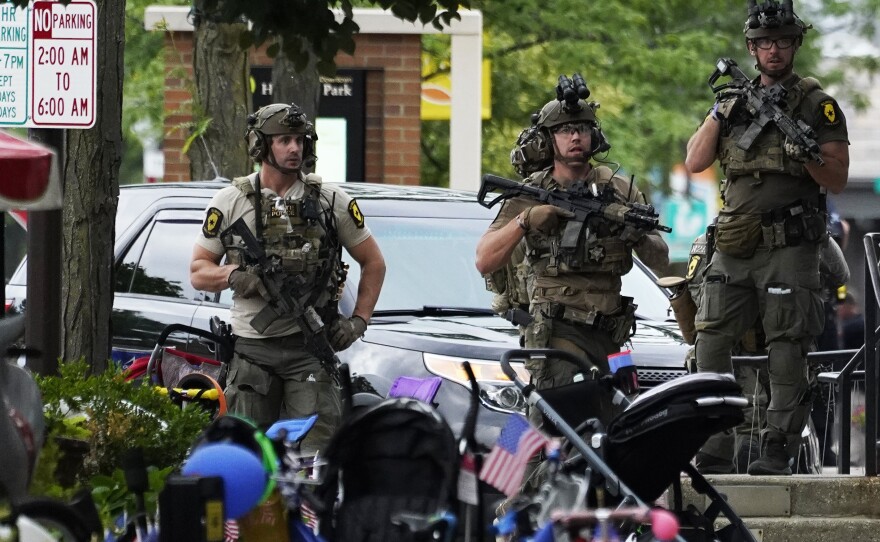So far this year, the United States has seen no shortage of mass shootings. The latest high-profile mass shooting took place on July 4 in Highland Park, Illinois, resulting in the killing of seven people and leaving many more injured.
What are the motivations for these acts of violence? And what can be learned by looking into the root causes behind those that commit them?
Tage Rai, a professor with UC San Diego’s Rady School of Management and co-author of the book “Virtuous Violence,” joined Midday Edition Friday to talk about his research into what motivates perpetrators of violence. The conversation transcribed below has been lightly edited for clarity.
You recently spoke with the San Diego Union-Tribune reporter Gary Robbins. And in the article you questioned the often immediate labeling of mass shooters as mentally ill. Why do you think that's a concern?
Rai: So, first, we know that a very low percentage of shootings in general, and also mass shootings, are committed by people with diagnosable mental illness. So, if we pursue policies that are really focused on that, one, they might not necessarily be effective, and two, what we know is they're just going to stigmatize people who are seeking mental health services.
Your research into the causes of violence suggests that there's often a deeper motivation for the perpetrators. Tell us more about that.
Rai: I think part of the reason that we have this automatic reaction to say, "well, a person must be mentally ill to do this," on some level, it's kind of comforting to think that no sort of rational, sane person would go out and kill a bunch of strangers — as opposed to kind of trying to think through the possibility that, actually, there are people out there who have values and commitments that are going to drive them to this kind of action. But what we find when we look at violence across the world, not just mass shootings, but all sorts of violence ... is that most of the time when people hurt another human being, they're doing so because they think they have an obligation to do it. They think it's the right thing to do. They think that their social communities are going to praise them for it. And, in a lot of cases, their particular communities will. So, in the case of this shooter, the community we need to be thinking about is not necessarily you or I. It's the kind of online right-wing extremist communities that he was floating in.
Is that the same thinking behind terrorists, for example?
Rai: I think this is a really good question that gets to part of your introduction to the segment, which is that an assassination of Shinzo Abe is very different from a shooter going to a July Fourth parade, which is very different from the other gun violence that happened in Chicago that same weekend. We have to tackle these things using kind of different approaches. But I do think the broader kind of question — well, what is motivating a shooter? — it has to come down to more than just mental illness. It's going to be something where people are seeking meaning through their actions. They're driven by ideological meanings. They're driven to do what they in their minds and what their social communities tell them is the right thing to do.
And, here in the United States specifically, we've seen mass shootings and other acts of violence driven by white supremacy, often by young white men, haven't we?
Rai: I think that's exactly right. So, particularly in the American context, what we're seeing is young white men driven by misogyny, driven by racism, driven by white supremacy, seeking a way to gain meaning through violence. And so, when those things come together, then you get the kinds of shootings that we've seen not just in Chicago, but elsewhere.
Did your research find any potential tools to counteract these ideological ties that you say can lead to someone committing violence?
Rai: When we're looking at something like mass shootings or just gun violence in particular, the approaches you want to take are sort of both kind of narrow and broad. On the broader level, we're really talking about changing these kinds of cultures that are feeding misogyny and racism and white supremacy to these young shooters. And that's a kind of bigger endeavor that involves breaking into these sort of online communities and changing the messaging and changing what people believe is right in these places.
Your research found that social pressure may be a key piece to combating these motivations. Can you tell us more about what your research experiments found there?
Rai: In some of our experiments, what we found is that people who commit harm really care about whether they are signaling that they are committing harm for what they believe their community thinks are the right reasons. And, if they think they will be seen as committing harm for the wrong reasons, then they don't want to do it anymore — or if they think that their communities won't approve of their violent actions and they're not going to want to do it as much anymore. And so really trying to communicate to people that violence is not going to be acceptable is going to be key, and that means actually making it not acceptable within those communities. When we've seen successful community interventions, oftentimes it's been the case where people who are prone to violence are confronted by people in their community who are expressing them that they don't approve of what's going on. And that really does have an effect.
What do you think the criminal justice system can take away from your research?
Rai: I think what we've seen from my experiments, my research and other people is that it's not going to be material incentives alone. So it's not going to be just punishments and jail time and fines or anything else. It's going to be a combination of material incentives and social incentives that people need to leverage peer pressure from their communities and change those actual social and cultural norms. And that's what's really going to have a big effect. Material incentives on their own just aren't disincentivizing to someone who believes that they're hurting others because it's the right thing to do in their minds.
Ultimately, you say that understanding what draws people to violence is really key to preventing it.
Rai: Absolutely. I think that if you want to prevent violence, then the first key is understanding the motives that underlie it. And oftentimes I think people are proceeding from an incorrect view that, if someone is being violent, it must be because something is sort of broken in their psychology — they're mentally ill, or they are just sort of seeking out some material incentives, or they're failing to empathize with their victims as human beings or something like that — when we need to confront possibly that actually a lot of their violence isn't driven by an absence of morality in their minds. It's actually driven by a presence of moralistic and ideological motivation that makes them feel that killing is something they have to do, something they need to do and something that will be seen later on as righteous in their communities.
Can you touch on the role race plays in that narrative you just laid out?
Rai: I think in the American context, especially in the right-wing extremist context especially, what we're seeing are a number of violent offenders, killers, shooters who believe that the white race, that men, are under attack and that they are under threat from women and minorities and that they need to take action and that's why they're doing what they're doing.
And also in the way that we label shooters or people who commit these acts of violence, too. Oftentimes the only people who are labeled as mentally ill when these types of violent events take place are white males when they've committed such atrocities.
Rai: Sure. So there's a broader discussion. That's a really good point that you're bringing up, which is that when we see oftentimes a Brown or Black suspect or foreign suspect, we may be more likely to go to something like terrorism and ideology as an explanation. But when we see a white suspect, then we go to this mental illness. I think this comes down back to people's stereotypes and racist biases that come in where they say, "well, hey." In the same way that we don't think that a mentally healthy person would do this, I think there are a lot of people who think, "Well, we wouldn't think that a well-off young white man would do these sorts of things — it must be that there was something that went wrong in their psychology." When, in actuality, young white men do these sorts of things and they do them for ideological moralistic reasons.
Do you think that the way we label these incidents and the people who perpetrate them stands in the way of how America responds? For example, after 9/11, people of the Muslim faith were profiled. Black people are profiled. White men who carry out these atrocities are not profiled or surveilled in the same way.
Rai: We do have this problem where if you are going to call a Brown suspect a suspected terrorist, then we're going to get profiling, we're going to get restrictions on them. If we are going to look at white supremacist-driven violence and label it as a mental health crisis, then we're going to stigmatize all the people who seek mental health services and we're going to miss on preventing violence that's driven by white supremacy, because we're not going to be looking for that.









